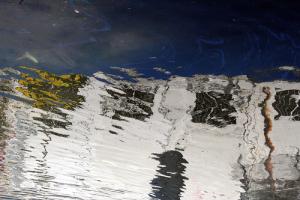
NPR detailed a story about chemicals called dispersants that are being used to help clean up the recent Gulf Coast oil spill. And given that BP's first effort of trying to stop the oil spill weren't successful, dispersants may play an even more important role.
Here's an excerpt from the NPR interview, with Elizabeth Shogren providing a layman's explanation of how dispersants work:
There's something that they used called a dispersant, and that's a kind of chemical that they can either spray from the air over large parts of the water. And this time they're actually even using it under the water near the source of the leaks. They're putting these chemicals called dispersants into the water.
And what they do is they break up the oil kind of like the way your dish detergent that you might spray into your sink breaks up the cloggy bacon grease, if you eat bacon, in your sink. And so that will scatter and cover up those oil molecules, which is something they want to have happen to protect wildlife.
You can read the complete NPR interview transcript or listen to the interview below.
Here's another explanation provided by LSU professor and analytical chemist Dr. Ed Overton on The Rachel Maddow Show.
Visit msnbc.com for breaking news, world news, and news about the economy
In a report on CNN, scientists claim that dispersants are not harmful to humans but can affect marine life, with fish eggs, larvae, shrimp and coral at most risk. BP has contracted with The Nalco Holding Co. to provide the dispersants and they explain that dispersants contain components that bond to oil molecules and separate them from water and break up the spill. Corexit 9500 is the name of the dispersant used and it's composition includes a proprietary organic sulfonic salt, petroleum distillates, and propylene glycol.
Charlie Henry is scientific support coordinator with the National Oceanic and Atmospheric Administration. According to CNN:
Henry said the dispersants being used in the Gulf show "fairly low toxicity." He added that any dispersant must be preapproved by the Environmental Protection Agency and listed on an approved product schedule before its use. A 2005 report by the National Research Council found that Corexit is "significantly less toxic than oil or dispersed oil," based on numerous studies. Nalco describes the product as biodegradable.
Jackie Savitz is a senior scientist with an environmental group who opposes offshore drilling called Oceana. While he admits that dispersants may be necessary, it's simply a matter of shifting the environmental impact. CNN:
"[Dispersants] make the oil more soluble in water, so it won't just sit on the surface," said Savitz. "Whether that's good or bad depends on whether you're a fish or a seabird."
Read the entire report on CNN: Officials weigh pros, cons of using dispersant chemicals on Gulf spill
What do you think?
image: http://www.flickr.com/photos/artolog/ / CC BY-NC 2.0
Related articles by Zemanta
- Progress toward Gulf oil well cap (reuters.com)
- Calmer weather raises hopes of containing oil slick (nationalpost.com)
- Gulf coast oil spill boosts this company's stock (money.cnn.com)
- Updates on the Oil Slick in the Gulf of Mexico (thelede.blogs.nytimes.com)
- Document: BP Didn't Plan for Major Oil Spill (abcnews.go.com)
- Toxic Oil Dispersant Used in Gulf Despite Better Alternative (wired.com)
- BP's public relations nightmare (capitolhillblue.com)


